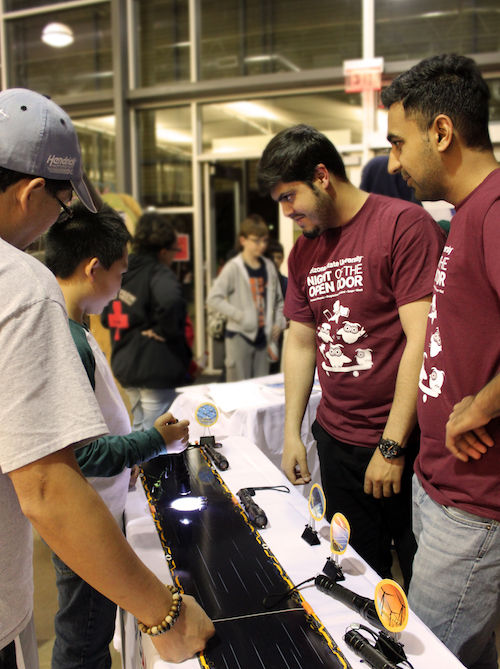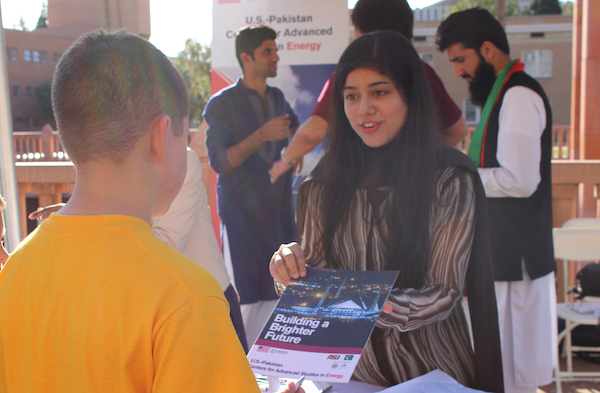Young engineers envision an energy-independent Pakistan

Above: Hira Rehman (in pink) and Asma Shamim (in gold) demonstrate the power of photovoltaics with members of the Tempe community during Night of the Open Door. Participants in the U.S.–Pakistan Centers for Advanced Studies In Energy program, the students recently demonstrated renewable energy concepts during ASU’s Night of the Open Door – an event during which Phoenix-area residents visit campus, meet faculty and students, and explore research projects. Photo by: Erika Gronek/ASU
Improving the energy grid in Pakistan is, without exception, the priority for a cohort of Pakistani graduate scholars studying engineering at Arizona State University this semester.
Participants in the U.S.–Pakistan Centers for Advanced Studies In Energy program, the students recently demonstrated renewable energy concepts during ASU’s Night of the Open Door — an event during which Phoenix-area residents visit campus, meet faculty and students, and explore research projects.
Toy solar car races at the USPCAS-E exhibit attracted many young guests, giving the engineering students an opportunity to explain the importance of developing renewable sources of power. They also handed out LED light-up fans that, when they spin, spell out, “Renewable Energy: I’m a big fan.”
USPCAS-E is a partnership between ASU and two leading Pakistani universities: the National University of Science and Technology Islamabad and the University of Engineering and Technology in Peshawar. Funded through the U.S. Agency for International Development, the program is designed to find innovative solutions to Pakistan’s energy challenges. The group of students, comprised of 18 men and 11 women, represents the third cohort to spend a semester at ASU before returning to Pakistan to complete their master's degrees.

Ussama Khalid Barki (left) and Usman Salahuddin (right) explain how photovoltaics could change the energy situation in their home country at Night of the Open Door on the Polytechnic campus. Photo by Erika Gronek/ASU
Different backgrounds lead to diverse solutions to common goal
A NUST grad with a bachelor’s degree in telecommunications engineering, Anam Zahara from Southern Punjab is now working on a master’s degree in energy policy, with a focus on electrical engineering, through the program.
“We have many rolling blackouts in my area of the country,” she explained. Her vision is to integrate her telecommunications and electrical engineering education so she can “be a part of the process that improves Pakistan’s energy infrastructure.”
Education is a priority in Zahara’s family – both parents are teachers, two sisters are medical doctors and another has a master’s degree in agriculture.
“One thing I’ve learned here is that time is money,” she said. “It’s important to be punctual for class.”
For Usman Salahuddin from Karachi, the decision to pursue an advanced degree in energy systems was born of frustration. With a bachelor’s degree in chemical engineering from NUST, Salahuddin found himself literally powerless on the job almost daily in the fertilizer industry.
“There was not enough gas to feed the furnace, so we’d have to shut down the factory,” he explained. “It taught me that we cannot rely on fossil fuels. We must develop renewable technologies that can be safely implemented for industry.”
His attraction to the USPCAS-E program was heightened by the opportunity to focus on entrepreneurship. “This program not only makes us researchers, it also emphasizes becoming entrepreneurs,” Salahuddin said. “I believe small start-up companies will contribute significantly to solving my country’s energy problems.”
“Physics is about making theories,” said Ussama Khalid Barki, who holds a physics degree from NUST. “Engineering is about execution.” Noting that his country is struggling, Barki said it’s time for action, not theories.
Barki is now pursuing a master’s degree in energy systems engineering with an interest in developing technologies for rechargeable, solar powered batteries, but said he is inspired by energy researchers at ASU. He says he would like to continue conferring with ASU faculty once he returns home and work toward his doctorate.
“I have a new perspective,” he said. “Scientists explore space, but engineers build the telescopes.”
Farah Akram, who has a power electronics degree from NUST, did not let her poor sense of direction thwart her aspirations to pursue a master’s degree in electrical power engineering. “The ASU campus is so big that I got completely lost on my first day,” she said, explaining that her campus at NUST was small in comparison. “But everyone was so helpful, and eventually I found my way.”
The majority of Akram’s family is in business and she, who describes herself as “extremely organized,” is the only engineer. “Our family is passionate about education,” she said. “Engineering made the most sense for me.”

Farah Akram explains to members of the public what USAID’s mission is in Pakistan at Tempe Night of the Open Door. Photo by Erika Gronek/ASU
Cultural exchange
Unanimously, the students declared the Arizona Renaissance Festival their favorite cultural experience to date. They donned crowns along with other festival-goers and enjoyed the jousting knights, circus performers, musicians and the marketplace.
Actually, marketplaces of all sorts are of interest to the students. “We love shopping,” said Zahara, who says she’s particularly enjoyed Arizona Mills and Tempe Marketplace — both accessible via public transportation.
But more important than shopping and festivals are the opportunities to collaborate with other students.
“I feel so welcome — faculty has been extremely supportive,” Akram said. “This has been an unimaginable, new experience.”
“The cultural exchange has helped me learn how to socialize with people who are different,” says Barki. “One day on a trip via the light rail, a group of elderly ladies got on — so we stood up and gave them our seats. Everyone clapped. It was definitely a notable moment.”
Salahuddin noteed that the learning exchange extends well beyond American customs and culture. “We are not just meeting American students — there are students from five different countries working on one of my lab projects,” he said. “Exposure to these new, wide-ranging perspectives will be incorporated into the problem-solving processes we use when we return home.”
More Science and technology

Hack like you 'meme' it
What do pepperoni pizza, cat memes and an online dojo have in common?It turns out, these are all essential elements of a great…

ASU professor breeds new tomato variety, the 'Desert Dew'
In an era defined by climate volatility and resource scarcity, researchers are developing crops that can survive — and thrive —…

Science meets play: ASU researcher makes developmental science hands-on for families
On a Friday morning at the Edna Vihel Arts Center in Tempe, toddlers dip paint brushes into bright colors, decorating paper…

